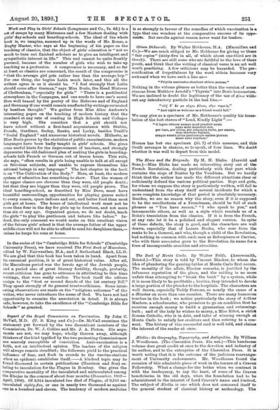Work and Play in Girls' Schools (Longmans and Co., 7s.
6d.) is a set of essays by many Mistresses and a few Masters dealing with girls' day-schools and boarding-schools. The ideal of the whole book is, we imagine, summed up in the words of Mr. Rouse, a Rugby Master, who says at the beginning of his paper on the teaching of classics, that the object of girls' education is "not so much to turn out finished scholars as to give an intelligent and eympathetio interest in life." This end cannot be quite frankly pursued, because of the number of girls who wish to take up teaching as a profession. A compromise is necessary, and so far at least as classics are concerned, the result of the compromise is *that the average girl gets rather less than the average boy." For one thing, she begins Latin much later, and this all the writers agree is as it should be. "I feel strongly that Latin should come after German," says Miss Beale, the Head Mistress of Cheltenham, "especially for girls." "There is a pestilential atmosphere in the Campagna, and one needs to have one's moral fibre well braced by the poetry of the Hebrews and of England and Germany if one would remain unaffected by writings saturated by heathen thought." We gather from Miss Alice Andrews's interesting paper on the teaching of modern history that the standard at any rate of reading in High Schools and Colleges is very high. She considers that a girl should not leave school without a first-hand acquaintance with Stubbs, Froude, Gardiner, Seeley, Ranks, and Lecky, besides Trail's "Social England" and numerous historical novels. Hitherto, as Miss Beale proves by the statistics of public examinations, modern languages have been badly taught in girls' schools. She gives some useful hints for the improvement of teachers, and strongly 'deprecates the old-fashioned plan of making the girls in boarding- schools talk French or German out of lesson hours. This rule, she says, "often results in girls being unable to talk at all except on frivolous subjects, and unable to express themselves like rational beings in any language." The last chapter in the book is on "The Cultivation of the Body." Here, at least, the modern system of education has something to show. That the women of the upper classes are cleverer than they were, old people doubt; but that they are bigger than they were, old people prove. The ideal boarding-school, as described by Miss Dove, must have beautiful surroundings, opportunities for playing games suited to every season, space indoors and out, and better food than most girls get at home. The hours of intellectual work must not be more than four in the day for girls up to fourteen, and not more than six at any age. Organised games, we do not doubt, teach the girls "to play like gentlemen and behave like ladies." In- deed, the only comment we would make on this excellent vision of the future girls' school is that the average father of the upper middle class will not be able to afford to send his daughters there,— unless he keeps his sons at home.


































 Previous page
Previous page